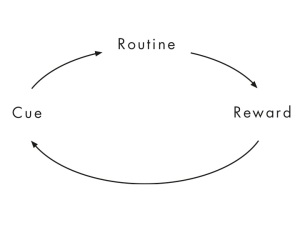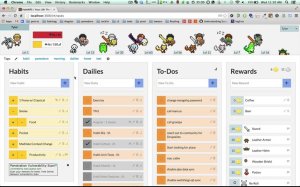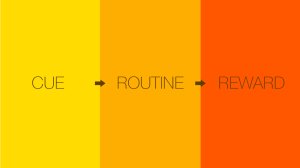I had this insanely elaborate blog entry planned out before my finals season started. However, before I got around to posting it, I ran out of time, and I had to prioritize what was most important (which coincidentally is a running theme in this entry). So here’s that very same entry – originally intended as a guide to final preparations for either GCSEs or SATs or whatever else you have coming up at the end of the semester.
In my case, I had to prepare for both an oral exam and all my written university exams. In addition to this, I had to write even more essays (this has really been the year of the essay for me, which I guess was to be expected when studying literature).
So here’s a guide to how to prepare for both oral and written exams, and getting through all of the course material leading up to your finals:
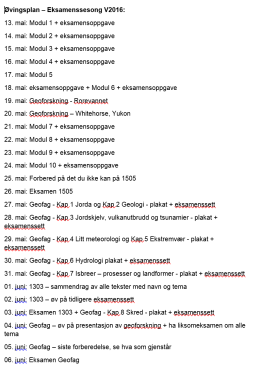
Simplify your daily choices – avoid decision fatigue:
This is a technique I have applied for many years, and I’ve included this year’s work plan above this passage. It is in Norwegian, but the basic gist of it is that it’s sort of a rough outline for what I have to get done every day leading up to the exams to stay on track.
Through this, I avoid having work pile up through procrastination, and I don’t lose 20-30 mins each morning, trying to figure out where I’m at, and what I need to get done.
This also helps with the terrible feeling one can get before an exam, where you feel as if the amount of work you have ahead of you is insurmountable.
- So in this step – figure out exactly what you have to know before the exam in these easy steps:
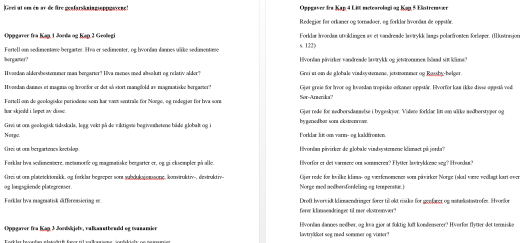
- Go through old exams, and make a document where you include all the old exam questions.
- Match this up with notes from the lectures and classes you have attended. What has the professor/teacher focused on the most in each of the modules?
- Create categories for all the questions, either by chapter or by theme (I have provided an example from my geology course, which again, is in Norwegian, but you see what I’m getting at.)
- Repeat for all your upcoming exams.
Portion out your work – trim the fat!
Which leads us to the next part of my three-step-plan to a stress-free exam period, which is portioning things out. In this part, you are going to have to trim the fat. What I do is that I combine all the questions that are similar, and create one more comprehensive and detailed question for each of the themes sub-questions. I try to dedicate equal time to the entire syllabus, because you never know when your professor is going to throw a curveball at you. So here’s my approach to portioning out your work:
- Count the days leading up to all of your exams, and create a document that has all of the dates in it.
- Now this part is important – DO NOT use your regular planner. This is you declaring Martial Law over your work habits, and a planner you have to search through to get to what you need to get done will only add to the inevitable decision fatigue you’ll feel throughout the exam season. Have it on one very visible page, print it out, and hang it somewhere you cannot avoid seeing it.
- Figure out your fudge ratio, and be honest with yourself – how much can you sustainably manage to do in a day?
- NOT how much can you force yourself to do, but how much will you do without passing out at the end of each day. If you are already strapped for time, try to use the days leading up to the exam to get an overview of everything, instead of aiming at the world champion title in statistics or chemistry or whatever subject you are struggling with.
- Leave the final day before every exam open so you can figure out where the gaps in your knowledge are, and close them.
Give yourself a break, literally.
I have blogged about this so many times, but take many short breaks, preferably by doing something active, like going for a walk or a run, or some other exercise that you like. Sitting and working all day will only make you sluggish and tired. My best tips for how not to spend your breaks:
- Turn off all your social media alerts. Deal with it before bed.
- You do not need to deal with all that femo, and agonize over how you are not able to go to every party or go out into the sun. And if you spend all your time snapchatting how much it sucks having to revise for your exams it’ll only suck even more when you get back to work.
- Do not sit down to watch TV.
- If I had one dollar for every time I lost track of my five-minute break time by sitting down and watching whatever crappy sitcom was on TV while I was having my break this exam season…
Just a few closing words (and a little shameless self-promotion):
I did a few extra things to keep myself on track, which might not apply to everyone. However, if you are the kind of person that is always coming up with new ideas about things to do, whether it is creative projects or practical things that need to get done, I highly recommend carrying a book with you, to write in whenever you feel a pang of inspiration.
This is sort of an adapted version of Tim Ferriss’ morning pages, where he tries to put his “monkey-mind” away before getting to work. My monkey mind never seems to let up throughout the day, so taking five minutes perhaps two or three times a day to sort through whatever creative plans you have for the evening or projects you want to get done over the summer helps me not derail from my work plan.

As far as the shameless plug goes, here are the links to some of my most read blog entries, which I think can be of use whether you are in an exam season, or if you just want to get your study habits sorted out in time for the next semester.
How to get organized for the new semester!
Finding YOUR best way to study!
Have a great summer
- Benedicte
